
Half of a Yellow Sun
‘This is why I came. They said she is controlling my son,’ Master’s mother said, stirring the soup. ‘No wonder my son has not married while his mates are counting how many children they have. She has used her witchcraft to hold him. I heard her father came from a family of lazy beggars in Umunnachi until he got a job as a tax collector and stole from hard-working people. Now he has opened many businesses and is walking around in Lagos and answering a Big Man. Her mother is no better. What woman brings another person to breastfeed her own children when she herself is alive and well? Is that normal, gbo, Amala?’
‘No, Mama.’ Amala’s eyes focused on the floor as if she were tracing patterns on it.
‘I heard that all the time she was growing up, it was servants who wiped her ike when she finished shitting. And on top of it, her parents sent her to university. Why? Too much schooling ruins a woman; everyone knows that. It gives a woman a big head and she will start to insult her husband. What kind of wife will that be?’ Master’s mother raised one edge of her wrapper to wipe the sweat from her brow. ‘These girls that go to university follow men around until their bodies are useless. Nobody knows if she can have children. Do you know? Does anyone know?’
‘No, Mama,’ Amala said.
‘Does anyone know, Ugwu?’
Ugwu placed a plate down noisily and pretended as if he had not heard her. She came over and patted his shoulder.
‘Don’t worry, my son will find a good woman and he will not send you away after he marries.’
Perhaps agreeing with the woman would make her exhaust herself quicker and shut her mouth. ‘Yes, Mama,’ he said.
‘I know how hard my son worked to get where he is. All that is not to be wasted on a loose woman.’
‘No, Mama.’
‘I do not mind where the woman my son will marry comes from. I am not like those mothers who want to find wives for their sons only from their own hamlet. But I do not want a Wawa woman, and none of those Imo or Aro women, of course; their dialects are so strange I wonder who told them that we are all the same Igbo people.’
Конец ознакомительного фрагмента.
Текст предоставлен ООО «ЛитРес».
Прочитайте эту книгу целиком, купив полную легальную версию на ЛитРес.
Безопасно оплатить книгу можно банковской картой Visa, MasterCard, Maestro, со счета мобильного телефона, с платежного терминала, в салоне МТС или Связной, через PayPal, WebMoney, Яндекс.Деньги, QIWI Кошелек, бонусными картами или другим удобным Вам способом.
Вы ознакомились с фрагментом книги.
Для бесплатного чтения открыта только часть текста.
Приобретайте полный текст книги у нашего партнера:
Всего 10 форматов

